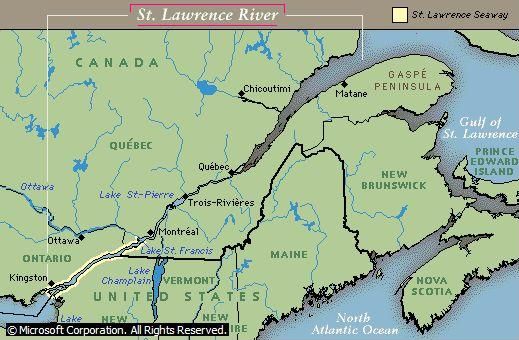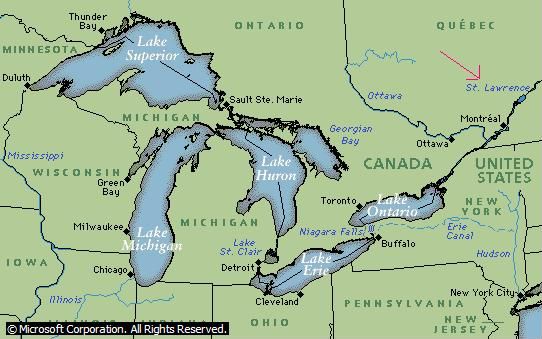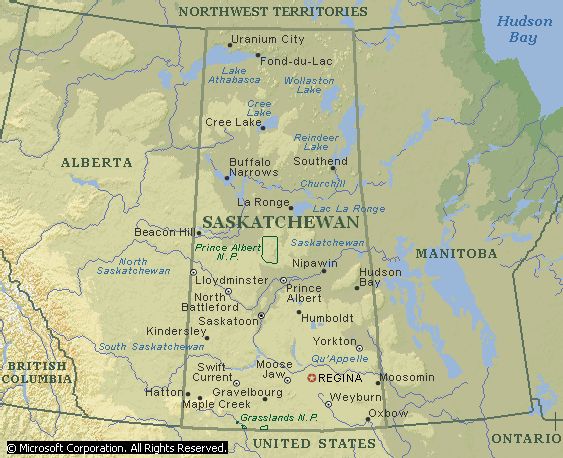.
Based on Merriam-Webster's
Collegiate® Dictionary
Use the BACK button
on your browser to return
The Saint Lawrence River 
flows about 800 miles (about 1300 km) from Lake
Ontario to the Gulf of Saint Lawrence. The river forms the border between
New York and Ontario and between Ontario and Québec before finishing
its course entirely in Québec. The most important commercial river
in Canada, the Saint Lawrence is part of the Saint Lawrence Seaway, a system
of waterways, locks and dams that facilitates the flow of cargo between
the Great Lakes and the Atlantic Ocean..Microsoft®
Encarta® Encyclopedia 99. © 1993-1998 Microsoft Corporation. All
rights reserved.
San Juan
Boundary Dispute, controversy
between the United States and Britain concerning the boundary between the
United States and Canada in the Strait of Juan de Fuca. The Oregon Treaty
(1846) settled the Northwest Boundary Dispute (see an encyclopedia) between
the two nations. The treaty defined the frontier as a line through the
middle of the channel separating Vancouver Island from the mainland, but
it did not spell out the ownership of the various islands the line crossed.
For 12 years the United States and Great Britain occupied the island. A
final settlement to the dispute was arbitrated by William I of Germany
in 1872. He awarded the San Juan archipelago to the United States..Microsoft®
Encarta® Encyclopedia 99. © 1993-1998 Microsoft Corporation. All
rights reserved.
sanction,
sanctioned,
sanctioning,
sanctions
authoritative permission
or approval that makes a course of action valid;
to give official authorization or approval to (administrations both corporate
and governmental, sanction greed at the cost of their reputation, showing
which is more important to them); approve
Saskatchewan

scheme, scheme,
schemed,
scheming,
schemes,
schemer
a secret or devious
plan; a plot; plan; a systematic plan of action;
an orderly combination of related parts; to plot (scheming their power
ambitions); to contrive a plan or
scheme for; to make plans, especially secret or devious ones
secede, seceded,
seceding,
secedes
to withdraw formally from membership in an organization,
association, or alliance; to withdraw
significance, significancy,
significant
full of meaning; important;
of consequence
signify, signified,
signifying,
signifies,
signifiable,
signifier
to denote;
mean; to make known, as with a sign or word (signify one's intent); to
have meaning or importance
snow job,
snow,
snowed,
snowing,
snows
an effort to cover, shut
off, or close off; to deceive, overwhelm, or persuade with insincere talk,
especially flattery; inveigle; to
close off with snow (we were snowed in)
so-called
incorrectly or falsely termed
(a so-called document purporting itself
as genuine)
sole
being the only one (the
sole survivor of the crash; single
sop, sopped,
sopping,
sops
to dip, soak, or drench in a liquid; saturate;
to take up by absorption (sop up water with a paper towel); to be or become
thoroughly soaked or saturated; something yielded to placate or soothe;
a piece of food soaked or dipped in a liquid
sovereign, sovereignly,
sovereign
self-governing; independent (living men and/or
living women in a country placing into positions
those they determine qualified to administer affairs living men and/or
living women approve of affecting them); a sovereign state;
a
sovereign individual or state (those of the human species who all have
souls); the sovereign power of the multiverse called God the Creator; an
living individual having potential of all the qualities of his or her soul;
a national governing council or committee as approved
by We
the People; a nation that governs territory
outside its borders; a gold coin formerly used in Great Britain was also
called a sovereign;.compare.Monarch;
the word sovereign also is used by those such as a king, a queen, a corporation
sole or other chief of state, ruler or monarch
who has usurped control away
from We
the People in order to subjugate them
Details:
"A state individual is immune from any and all government attacks and procedure,
absent contract." see, Dred Scott vs. Sanford, 60 U.S. (19 How.) 393 or
as the Supreme Court has stated clearly "every man is independent of all
laws, except those prescribed by nature. He is not bound by any institutions
formed by his fellowmen without his consent."
CRUDEN vs. NEALE, 2 N.C.
338 2 S.E. 70 "in common usage, the term 'person' does not include the
Sovereign, statutes employing the word person are ordinarily construed
to exclude the Sovereign." Wilson v. Omaha Tribe, 442 U.S. 653, 667 (1979)
(quoting United States v. Cooper Corp., 312 U.S. 600, 604 (1941)). See
also United States v. Mine Workers, 330 U.S. 258, 275 (1947).
The idea that the word 'person'
ordinarily excludes the Sovereign can also be traced to the "familiar principle
that the King is not bound by any act of Parliament unless he be named
therein by special and particular words." Dollar Savings Bank v. United
States, 19 Wall. 227, 239 (1874).
As this passage suggests,
however, this interpretive principle applies only to "the enacting Sovereign".
United States v. California, 297 U.S. 175, 186 (1936). See also Jefferson
County Pharmaceutical Assn., Inc. v. Abbott Laboratories, 460 U.S. 150,
161, n. 21 (1983). Furthermore, as explained in United States v. Herron,
20 Wall. 251, 255 (1874), even the principle as applied to the enacting
Sovereign is not without limitations: "Where an act of Parliament is made
for the public good, as for the advancement of religion and justice or
to prevent injury and wrong, the king is bound by such act, though not
particularly named therein; but where a statute is general and thereby
any prerogative, Right, title or interest is divested or taken from the
king, in such case the king is not bound, unless the statute is made to
extend to him by express words." U.S. Supreme Court Justice Holmes explained:
"A Sovereign is exempt from
suit, not because of any formal conception or obsolete theory, but on the
logical and practical ground that there can be no
legal Right as against the authority (We
the People)
that makes the law on which the Right depends."
Kawananakoa v. Polyblank, 205 U.S. 349, 353, 27 S. Ct. 526, 527, 51 L.
Ed. 834 (1907). McNally v. U.S., 483 U.S. 350, 371-372 (1987), Quoting
U.S. v. Holzer, 816 F.2d. 304, 307: “Fraud in its elementary common law
sense of deceit – and this is one of the meanings that fraud bears in the
statute, see United States v. Dial, 757 F.2d 163, 168 (7th Cir. 1985) –
includes the deliberate concealment of material information in a setting
of fiduciary obligation. A public official
is a fiduciary toward the
public, including, in the case of a judge, the litigants who appear before
him and if he deliberately conceals material information from them he is
guilty of fraud.
sovereignty, sovereignties
can only be exercised by those that own the land.(*);
the right to exercise the power of Eminent
Domain which is inherent
in sovereignty; sovereignty is living man and living woman on Earth given
to all the human species by the Creator; sovereignty is supremacy of authority
or rule as exercised by a sovereign or sovereign state (that is, possessing
Eminent Domain status (those who live on the land and work in the area,
own the land); sovereignty is complete independence and self-government
of We
the People; sovereignty is a territory
existing as an independent state; sovereignty is supremacy of authority
or rule as exercised by a sovereign or sovereign state comprised ofWe
the People; authority or power;
internationally, a sovereign state exists in equality with other sovereign
states; a sovereign state can, in accordance with
its constitution laid down by
We
the People govern its own territory, acquire
offshore properties, regulate trade and commerce, create interest free
money or operate as a society dependent upon each other in
lieu of anything but good will in their dealings with others (see Michael
Tellinger videos) that represents their efforts, set up communication services
for the nation such as an Internet, postal service, militia, military,
naval service, defence, navigation, shipping, matters of aboriginals and
their lands, naturalization and aliens, constitutional criminal law, local
& municipal purposes, management & sale of lands the public deems
necessary & timber & wood on them, administration of justice, property
& civil rights, local projects, works & undertakings and so on.
The United
Nations was the main legal, but not lawful, body today that attempted to
be a check on sovereignty. Switzerland and other nations refuse to be a
part of the UN and the USA corporation is a member. For that and
other reasons, fewer and fewer nations trust the UN & USA. Many countries
call what they purport to be their constitution, but if it's not of and
by We the People,
it's just another name for the con
of subjugation
spurious, spuriously,
spuriousness
lacking authenticity
or validity in essence or origin; not
genuine; false; a sham; a farce
state1
the supreme public power
within a sovereign.political.entity,
often called We
the People, as given by God the
Creator to them; the sphere
of supreme civil power within a given polity;
matters of state; one of the more or less internally autonomous
territorial and political units
composing a federation under a
We
the People sovereign government.(the
48 contiguous {touching, sharing boundaries}) states of the Union; relating
to an internally
autonomous territorial
or political unit constituting a federation
state2
a set of circumstances or attributes
characterizing an individual or thing at a given time
statute
a law enacted by a legislature;
a decree or an edict; an act
stealth, stealthy,
stealthier,
stealthiest,
stealthily,
stealthiness
the act of moving, proceeding, or acting in a
covert
way; the quality or characteristic of being furtive
or covert; marked by or acting with quiet, caution, and secrecy intended
to avoid notice; secret
strange, stranger,
strangest,
strange,
strangely
not previously known; unfamiliar;
out of the ordinary; unusual or striking; differing from the normal; not
of one's own or a particular locality, environment, or kind; exotic; reserved
in manner; distant; not comfortable or at ease; constrained; not accustomed
or conditioned (she was strange to her new duties)
stratagem
a clever, often underhand
scheme
for achieving an objective; a military
maneuver designed to deceive or surprise
an enemy; artifice
status quo
the existing condition or state of affairs; conventional;
average
subject
being in a position or in circumstances that place
one under the power or authority of another or others (people in subjection
to the whims of the ruling masters); prone; disposed(a government which
is subject to the will of the people); contingent or dependent (politicians
being subject to the changing demographics); one who is under the rule
of another or others, especially one who owes allegiance to a government
or ruler; a course or area of study (Math is her best subject); a basis
for action; a cause; one that experiences or is subjected to something
(politicians are supposed to be subject to the will of the people; they
made him the subject of ridicule); one that is the object of clinical study
(the experiment involved 12 subjects; one who is under surveillance (the
subject was observed leaving the scene of the murder); to submit for consideration;
to submit to the authority of; to expose to something (the patients on
that ward were subjected to infection); to cause to experience (the campers
were subjected to extreme weather}; to subjugate; subdue
Grammar.–.the
noun, noun phrase or pronoun in a sentence or clause that denotes the doer
of the action or what is described by the predicate and that in some languages,
such as English, can be identified by its characteristic position in simple
sentences and in other languages, such as Latin, by inflectional endings;
the mind or thinking part as distinguished from the object of thought
subterfuge
a deceptive.stratagem
or device
in a strange manner
surety, sureties,
suretyship
a pledge or formal promise
made to secure against loss, damage, or default; a guarantee or security;
one who has contracted to be responsible for another, especially one who
assumes responsibilities or debts in the event of default; something beyond
doubt; a certainty; the condition of being sure
surreptitious, surreptitiously
done, made or acquired by stealth;
clandestine;
acting or doing something clandestinely; stealthy; secret
system
a set or arrangement of things so related or connected
as to form a unity or connected whole; organic
systematic
forming or constituting a system
systematical
of, characterized by, based on, or constituting
a system; carried on using step by step procedures; methodical
systematically

I n d e x o
f s i t e
.
|